| “ | Or perhaps, Carol... It wouldn't be too surprising for you and I to be the people—or the characters—who begin this tale. | ” |
"The Vice President Doesn't Say Anything about the Possibility of Him Being the Main Character" is the first episode of the 2007 Baccano! anime.
Funimation Blurb[]
- First Version
Here's what's what: They weigh the pros and cons of jumping to conclusions when considering a caper with almost twenty lead characters that spans centuries. He takes a bullet to the head. A sharp looking young man loses a few fingers for a few seconds. She takes a dip. They don’t need luck to survive an attempted hit on their lives. A turf war is raging. Even with a bloody stump, he would still like to kill the love of his life. He's got a big mouth and a bad habit of killing men with a certain surname. There’s still one left. They believe a cover-up is called for when corpses start stacking up along the tracks. Friends new, old, and immortal wait at the station. A journey that will soon begin is completed.
- Later Version
Here's all you need to know: A turf war is raging. He takes a bullet to the head. She takes a dip. He's got a bloody stump. He loses some fingers for a second. Friends new, old, and immortal wait at the train station.[1]
Full Summary[]

Carol, researching.

Rainbow philosophy over tea.
A girl called Carol is reading an alchemy book when The Daily Days Vice President Gustav St. Germain arrives and rebukes her for the mess of books, newspaper clippings, and miscellaneous papers scattered on the table around her. She apologizes and explains that she has been researching more information for their 'story' because she cannot stop thinking about the strange events that began in November 1930.
Gustav asks if she remembers a conversation they had on a train about a rainbow outside their window, which proceeded as follows: Gustav remarks that mankind, just as Carol is doing, views rainbows as delightful wonders rather than harbingers of disaster. He wonders why this is the case and asks if Carol has ever wondered likewise. She admits that she has not before arguing that their job as reporters is not to wonder about but report on past or ongoing events. Gustav gives her 319 points but points out that as people they should never stop thinking. Furthermore, to only bother to ascertain the truthfulness or falsehood of information would be to make a mockery of their profession. Carol complains that thinking about something does not change its validity. Gustav disagrees.
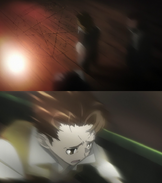
Where to start?
In the present, Gustav concludes that what they report is "merely the precursor to a conclusion" and asks Carol why she decided that 1930 is "the beginning." She does not have a ready answer, which Gustav berates her for; he assists his assistant by naming the events aboard the Advena Avis and the covered-up tragedy of the Flying Pussyfoot as two of many other viable starting points along on the timeline, then repeats his question. This time, Carol is ready: she wanted to make the story easier to understand, so she chose the time when the story was first brought to their attention.
Carol's answer is afforded 156 points and the compliment "good," although Gustav adds that is more important to focus on the 'characters' than the timeline. He names several candidates for main characters: Isaac Dian and Miria Harvent, the latter seen crying out when Isaac's ear is cut; Ladd Russo, seen shooting the boy Czeslaw Meyer aboard the Flying Pussyfoot; and Luck Gandor, "the Gandor Family's brilliant young capo," seen gunned down in a hail of bullets.
Carol picks up a photograph of a young man and asks, "What about this guy?"
Partway down a street, Firo Prochainezo stops walking to a acknowledges a panhandler citing the Lord's name as he begs for money.
Carol declares that Firo is without a doubt "main character-ish," Gustav raises an eyebrow.
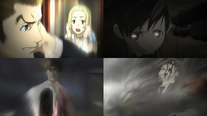
Who are the main characters?
Feeling generous on account of his good mood, Firo opens his flush wallet and gives the panhandler two dollars before continuing on his way. The panhandler reaches into his bag for some 'flowers' but retrieves a knife instead, rushing Firo a moment later. Back in the present, a blushing Carol insists that Firo is a good candidate.
Firo catches the knife with his right hand and loses his index and little fingers as a consequence. The panhandler laughs, then gasps as the fingers reattach themselves. He flails his bloodless knife around as he cries "monster." Firo introduces himself as "Firo Prochainezo of the Martillo Family" before punching the beggar's face with his healed hand.

Firo, his hand whole once more.
Gustav laughs and says that he sees what Carol means by "main character-ish," though he adds that there are as many sides to the same story as there are people. His words trigger a montage of black-and-white scenes invoking the zeitgeist of 1930s-era America, including: Prohibition Enforcement Agents dumping and smashing barrels of alcohol; Hollywoodland and jazz bands; the homeless; unemployed men seeking jobs; and lines of men at soup kitchens, all interspersed with color shots of casinos and mobsters gunning down various establishments.
The montage gives way to a large mansion, where Gustavo Bagetta orders a large group of gun-toting men to destroy all who dare to infringe upon their world. Be they Martillos or Gandors, Gustavo cares not so long as they are wiped off the face of the Earth.
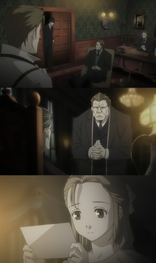
The Gandors, Runoratas, and Eve are all connected to Dallas.
In the Gandors' office in Coraggioso, Luck informs Berga Gandor that Tick Jefferson is interrogating someone on Luck's orders. A Gandor subordinate reports to Keith Gandor that several Gandor establishments have come under fire once again: a gambling parlor, speakeasy, and ticket window. No casualties. Berga vows to deliver unto the Runorata Family their comeuppance; when the subordinate adds that one of the perpetrators was captured, Berga leaves the office to assault the perpetrator.
Carol asks if Gustav is implying that everything started with the mafia conflicts; Gustav asks her to consider 'something' in particular.
Without his earlier bravado, Gustavo tells Bartolo Runorata that his men have gunned down Luck Gandor and that he has received intelligence on a new bomb prototype. He suggests that once they obtain the explosives, dealing with the Gandors and the Martillos will be child's play.
Bartolo would rather Gustavo focus on another matter, and he takes out a photo of Dallas Genoard. Elsewhere, a girl called Eve Genoard holds up a different photograph—one of herself and a younger Dallas—and wonders where Dallas has gone.
Having recalled this exchange, Gustav looks out a window and suggests that it would not "be too strange" if he and Carol turn out to be the characters who begin the tale.
Title card.
Back in 1931, Gustavo identifies Dallas in a photograph as the second son of the Genoard Family. Bartolo recalls how Gustavo killed Dallas' father Raymond and older brother Jeffrey without permission and lies that Dallas recently contacted the Runoratas about their murders. Alarmed, Gustavo protests that no proof of their murders should exist, especially since he bribed the court.
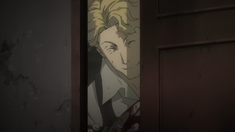
Tick, referred to as "Chick" in the anime.
The fact remains that Dallas somehow fingered Gustavo as the culprit. Bartolo orders Gustavo to prioritize finding Dallas over his quarrel with the Gandors and expresses no preference over whether Dallas is found dead or alive. After Bartolo leaves the room, Gustavo relays the orders to the men assembled on the lawn. Listening to Gustavo's crude speech through the door, Bartolo calls Gustavo a "wretched bastard" under his breath.
Keith and a very alive Luck exit the office to confront the captive, who stammers at how Very Alive Luck is. A cheerful-looking man with bloodstained scissors cracks open a door when Luck calls his name and then asks if he can fit another person into his busy schedule. Tick replies that he can; however, as he has yet to clean his sisters, "it" will hurt much more than normal. Against the bloodstain wall behind him slumps a likewise bloodied man. Terrified, the perpetrator frantically promises to tell the Gandors anything so long as they keep Tick away from him. Luck demands the name of the person who ordered him killed.
The attempted hit on Luck took place in a bookshop, where Luck was—is—reading a complete collection of Edgar Allen Poe's complete works in a small bookshop. When Firo greets him from the front entrance and asks what he is reading, he obliges by reading off a verse of Edgar Allen Poe's poem "Spirits of the Dead." Firo applauds the performance, but Luck admits that he used to be afraid of the poem before he lost all reason to be afraid of death. Firo fails to understand or relate to Luck's point of view, so Luck asks him to forget everything he just said.
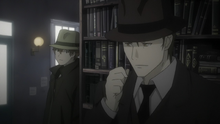
Firo and Luck in the bookshop.
Firo changes the subject by bringing up the strange men who have started loitering around Martillo turf. Luck guesses that they may be connected to the Runoratas due to the Gandor-Runorata feud and warns Firo to stay out of it, for "Vino" will be providing them backup. Surprised and delighted, Firo asks if "Claire" is really dropping by; Luck confirms that Claire will be arriving in New York on the Flying Pussyfoot tomorrow morning. So are Isaac and Miria and an old friend of Maiza Avaro, as it turns out. Luck is midway through suggesting that he and Firo pick their friends up at the station together when a car screeches outside and its occupants open fire on the shop. Firo, Luck, and the bookshelves collapse in the onslaught.
Elsewhere and elsewhen, a sizable police force carries out an investigation by the railroad tracks under light snowfall. Edward Noah and Bill Sullivan grimace when a policeman pulls back a sheet covering one of the corpses strewn by the tracks. The officer confirms that these corpses are unmistakably those of passengers aboard the Flying Pussyfoot on account of their mangled or otherwise poor condition. He estimates the corpses discovered so far number in the 'teens, though he adds that the trail of corpses continues for miles.
Bill and Edward rebuff the policeman's question of "what happened here" by calling the case classified. Once inside their vehicle, Bill says to Edward that the passenger list in Chicago has confirmed the presence of immortals aboard the train. Edward inquires as to the safety of a certain lady, and Bill replies that that their orders are to investigate her safety next. As he wonders if an incident of this magnitude can be covered up, another officer approaches his window and reports that they have found survivors amongst the bodies.
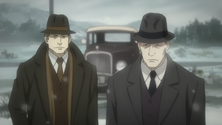
Edward (left) and Bill (right).
Once the tommy-toters outside the shop finally cease their fire, both the shopkeeper and Luck rise. The former exclaims with shock that he saw Luck "shot dead with [his] own two eyes." Indeed, Luck's suit is riddled with bullet holes. Luck smiles.
In an opulent lobby stand a katana-wielding woman and a group of delinquents. A spearwoman hefts her spear and says that there should be "no problems" as Isaac cries out in pain, hand clapped to his ear. He lowers his hand a moment later; astonished, he says that the wound no longer hurts. Miria observes that the cut has disappeared completely, thinking it some sort of magic trick.
In a darkened freight hold, the blood spattered on all nearby surfaces returns to Czeslaw Meyer's corpse. Czes sits up, head fully intact, and mutters, "What a useless thug."
Back in the bookshop, blood retracts from the bookshelves just as Czes' blood did from the walls. Firo bursts out of the shop and kicks one of the assailants moments before his companions flee via automobile. The shopkeeper stammers out questions that Luck ignores in favor of calling out Firo's name. Firo reappears at the wrecked entrance and throws the assailant—the man to be tortured by Tick—onto the floor. Luck promises the shopkeeper sufficient recompense for the damages; the shopkeeper hastily promises to keep silent about the incident. Satisfied, Luck looks down at the captured man and says that he cannot ignore the man's crimes.
A Red Shadow reads a message that has been carved into the roof of a moving train, aided by the light of the rising sun. The message's writer has pledged to wait for the figure in Manhattan, and the Shadow vows to search for the writer in turn before hopping off the side of the train.
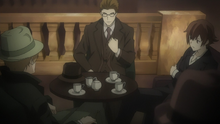
Firo, Maiza, and Ennis.
At Grand Central Station, Firo occupies a table with Maiza and Ennis while the Gandor brothers sit at a table nearby, with the tea on their tables suggesting that they have been there for a while. Firo remarks that he has heard that the Flying Pussyfoot is a one-of-a-kind train, and is only all the more eager to see it when Luck dismisses it as 'ostentatious'. Ennis glumly informs him that the train's passenger cars have apparently been switched out for flatcars due to some sort of breakdown, which Maiza verifies and follows with a reminder that the steam engine will have been switched out for a modern electric one as well (due to procedure as opposed to an accident).
Recovering from his disappointment, Firo inquires into the character of Maiza's 'old friend'; Maiza describes his friend as introverted, someone who carries the weight of the world on his shoulders and thus appears 'fragile' as a result. Luck presumes that his friend must be the type who would not 'last long' if he were a 'normal person', and Berga chimes in that Claire is the same way for a opposite reason: he is cheerful, but too stubborn.
Ladd asks the armed policemen surrounding him and Lua Klein next to the railroad if they plan on watching him bleed out or taking him into their custody, warning them that he is in a foul mood. The men are too cowed by his blood-soaked appearance too move. He wipes away Lua's tears and croons that he would have killed Lua sooner if he had only known things were going to turn out 'like this'. When she hesitates after he offers to kill her now, he gestures dramatically with his left arm and questions whether she ever wants to be killed by him. The policemen recoil at the sight of Ladd's flayed forearm, which is missing its hand altogether.
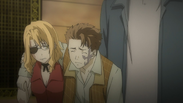
The injured delinquent and his friends, disembarking.
The Flying Pussyfoot finally pulls into the station, and its passengers parade past Firo and company in varying stages of distress. Included among them are an injured woman in coveralls, a giant, a scarred woman, and an injured youth.
Elsewhere, a group of people are fishing cargo out of a river. One of them spots and calls out to a woman clinging to one of the floating crates. She raises her head from where it was buried in her arms.

The woman in the river.
While the Gandor brothers look on, Isaac and Miria reunite with Firo, Ennis, and Maiza in jovial fashion—their delight a sharp contrast to the other passengers' somber demeanor. Firo remarks that Isaac and Miria look 'like hell' and wonders what happened on the train. Behind them, Czes steps off the train and affords Maiza a sullen expression; Maiza, upon spotting him, offers him a warm smile.
Preview[]
Isaac & Miria puzzle over where the place ‘Aside’ could be, after misinterpreting the title of the next episode: "Setting the Old Woman’s Qualms Aside, the Flying Pussyfoot Departs."
Differences between the Anime & Novels[]
The opening conversation between Gustav and Carol in the Daily Days is partially referenced in 1935-A: Deep Marble.[2] See Trivia for a relevant short story.
1930[]
Click "Expand" for differences regarding the 1930 timeline.
In the anime, the scene with Firo and the panhandler clearly takes place after Firo becomes immortal. However, their encounter actually takes place before Firo becomes immortal in The Rolling Bootlegs: Firo rants about God, avoids the knife entirely, punches the beggar with a fist full of bloody coins that spill onto the man's face and mouth. Edward and other policemen arrest the panhandler in the aftermath, from which Maiza rescues Firo and leads him off to buy a hat.
1931[]
Click "Expand" for differences regarding the 1931 timeline.
It is only Eve who is searching for Dallas in 1932 Drug & The Dominos, ergo Bartolo never lies to Gustavo about Dallas contacting the Family like he does in the anime. Gustavo in the novels instead searches for the junkie who stole a bag filled with Begg's latest drug prototype. Since the anime culls Begg from 1932, it does not mention that Begg is the one who commissioned the explosives from Czes. The anime also excludes Nicola Casetti, a capo who also reports the Runorata hits to the Gandors despite his injury.
The bookshop scene is quite different: Luck is alone when he is targeted in the bookshop and dies when a junkie slits his throat. The anime omits the assassination attempt on Berga, for which Firo is present for and has an opposite attitude concerning the Runorata-Gandor feud; where Firo in the anime is happy to volunteer his help, Firo in the novels warns Berga that he must not drag the Martillos into the matter.
Bill and Edward's discussion in the anime is a tad truncated; Bill asks Edward to recite the characters of immortals in the novel, and notes that Donald Brown is currently investigating whether or not the immortals on the train had a hand in the massacre.
Jack makes a cameo as one of the delinquents retrieving the cargo from the river, but in the novels he plays a much more substantial role as one of the delinquents accompanying Jacuzzi on the Flying Pussyfoot.
Isaac and Miria re-enter the train to fetch Czes in the novels, but Czes steps off the train on his own accord in the anime.
Who and Fred, the latter a red herring for Maiza's old friend in the novels, follow the woman in coveralls off the train in the novels. In doing away with them the anime does away with a red herring for Czes entirely and instead implies he is the old friend in Episode 01's last scene.
Trivia[]
- The book in the episode's opening shot features an Ouroboros on its cover and is written by "Theophra—" (Carol's arm hides the rest of the name). This book is likely written by the alchemist Paracelsus Theophrastus von Hohenheim, whose writings about homunculi are referenced in the light novels. The Ouroboros is typically thought to symbolize an eternal cycle of life, death and rebirth and, when its skin sloughs, metempsychosis.
- Anachronism: The two-page legal spread that Carol is studying at the very beginning of the anime appear to reference an actual Colorado order of dismissal with prejudice from August 20, 1993 involving Judge Richard P. Matsch, clerk James R. Manspeaker, and plaintiff Stuart [sic] Anthony Webb. Using filler text for documents that are only seen briefly in an episode or movie is an extremely common filmmaking practice.
- The rainbow conversation between Gustav and Carol is from the ninth light novel 1934 Alice in Jails: Streets, and originally took place in December 1934.
- Anachronism: The International Kerald Tribune/Asahi Shimbun newspaper that Gustav is reading on the train, seen later in Episode 04, is a stand-in for the International Herald Tribune/Asahi Shimbun, an actual English-language newspaper published between 2001 and 2011. Staff likely borrowed an issue published in April 2007, since page two of Gustav's copy includes the article "Kurt Vonnegut, dark comic writer, dies."
- $2.00 in 1930 is equivalent to $24.83 in 2007 and $36.85 in 2023.
- Screenwriter Noboru Takagi has stated that Gustav's reciting of "this story begins from..." was inspired by the beginning of Hisashi Inoue's Kirikirijin.[3] Gustav's comments about beginnings, endings, and main characters also echo a very short story by Ryohgo Narita published on February 10, 2007 in the 電撃文庫総合目録2006 SPECIAL EDITION (Dengeki Paperback Comprehensive Catalog 2006 SPECIAL EDITION). The story's narrator, Theodore St. Germain, a twenty-first-century information broker implied to be descended from Gustav, names events from the 1930s, 1700s, and 2000s as viable candidates for Baccano!'s beginning.
- The scenes featuring Adele in the manor are derived from 1933 (First) The Slash -Cloudy to Rainy-, the sixth novel in the series. The 1933 arc has yet to be fully adapted in any form.
- The poem that Luck reads is Edgar Allan Poe's "Spirits of the Dead." Its narrator, a dead spirit, informs their grave's visitor that those known to the visitor in life will surround them in death.
- The bookkeeper who witnesses Luck die breaks his silence about immortals in 1932 Summer: Man in the Killer when he warns Mark Wilmens not to involve himself in their affairs.
- Goof: In the reunion scene in Grand Central Station. Luck and Keith should be wearing brown and blue suits respectively. Instead, Luck's suit is blue and Keith's brown. This shot is reused in Episode 15 as is.
- Goof: In 1931, Union Station directly connected to New York's Pennsylvania Station (as stated in the light novels), not to Grand Central Station. The original Penn Station was destroyed and rebuilt in 1963, so the anime's location scouting team in November 2006 visited and took reference photographs of Grand Central Station instead.
- As this is the first episode, it is one of four episodes in total which do not have recap scenes in the opening credits.
- An earlier version of the four tommy-toting mobsters in the montage (timestamp 08:51) as included in anime's first PV features a different background and only three mobsters, behind whom Gustavo smokes a cigar.
New Characters[]
Unanswered Questions[]
- How did Firo, Luck, and Czes survive being shot? How did Firo's hand heal?
- What happened on the Advena Avis and the Flying Pussyfoot?
- What exactly does Bill mean by 'immortals'? Who is the lady he mentioned?
- Who is Vino?
- Why did Ladd shoot Czeslaw?
- How did Ladd and Lua survive the Flying Pussyfoot?
- How did Ladd lose the flesh off his forearm? What about the cut in his right ear?
- What was the year-old incident that Luck mentioned?
- What was Jacuzzi running from?
- How did Jacuzzi and the woman in coveralls obtain their injuries?
- Who left the message on the roof, and who read the message?
- Where is Dallas Genoard?
- How and why did the black-clad woman wind up in the river?
- Who were the people by the riverside?
- How do Czeslaw and Maiza know each other?
- Was Claire among those who arrived at the station?
Quotes[]
- "Still, Carol... Depending upon which of these interesting characters you focus, the same incident will behave like the surface of an ocean, changeless yet ever-changing. In other words, there may be but one event that has many stories as there are people to tell them." —Gustav St. Germain (English dub).
- "I used to be so scared of this poem I couldn't stand it. But now...it doesn't seem to bother me. Not since what happened a year ago." —Luck Gandor (English dub).
